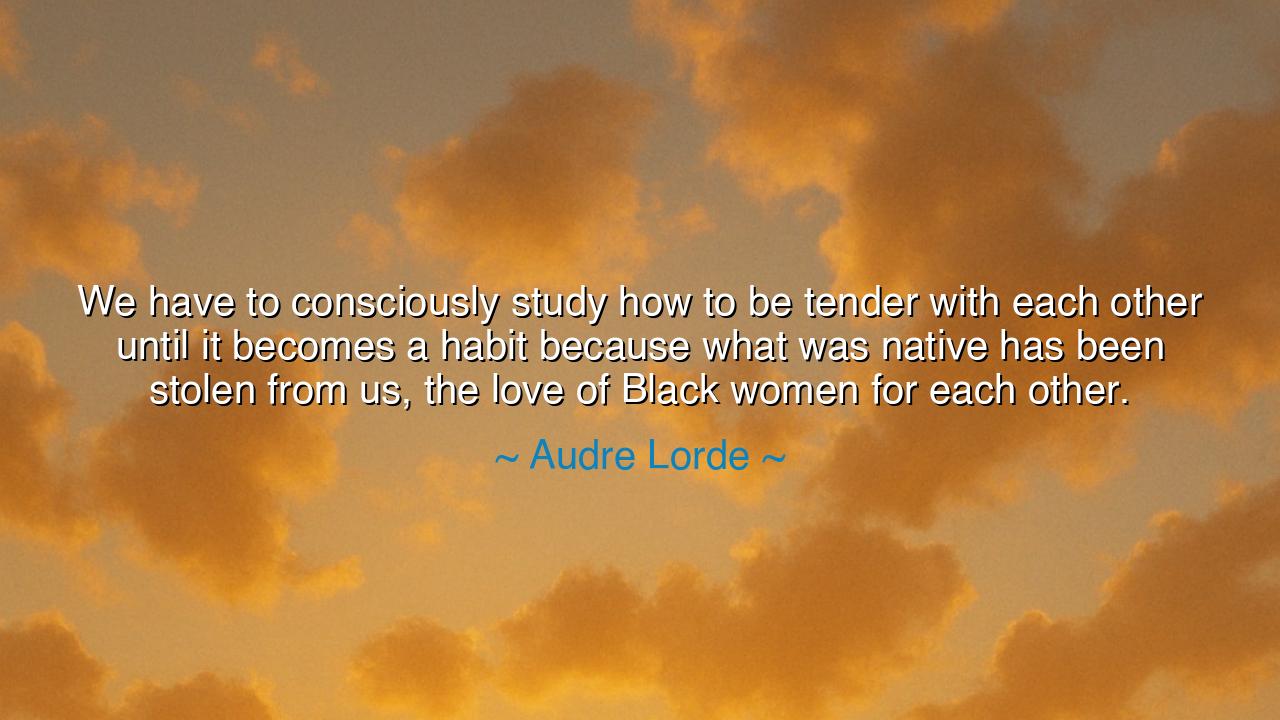
We have to consciously study how to be tender with each other
We have to consciously study how to be tender with each other until it becomes a habit because what was native has been stolen from us, the love of Black women for each other.






Hear, O children of remembrance, the fiery and tender words of Audre Lorde: “We have to consciously study how to be tender with each other until it becomes a habit because what was native has been stolen from us, the love of Black women for each other.” This is not merely a lament, but a call to restoration. It is a summons to reclaim what oppression has tried to erase: the natural love and tenderness that once flowed freely among women bound in sisterhood, now fractured by the cruelties of racism, sexism, and systemic division.
For Lorde proclaims that tenderness, which should be instinctive, has been stolen by centuries of degradation. Enslavement tore mothers from daughters, sisters from sisters, and poisoned bonds with mistrust, competition, and silence. The love of Black women for each other, once the root of strength and survival, was disrupted by forces that sought to divide in order to dominate. Yet Lorde declares that love is not lost forever—it can be relearned, made conscious, and through practice restored as a living habit.
History bears witness to this theft. In the age of slavery in America, women were deliberately separated, their families broken, their humanity denied. Even after emancipation, the long shadow of Jim Crow and systemic oppression continued to undermine solidarity, forcing survival at the cost of unity. Yet within these struggles, sparks of sisterhood endured—in secret gatherings, in shared songs, in the passing of wisdom from one woman to another. Lorde’s words name this endurance and call for its deliberate renewal.
Consider also the power of the Harlem Renaissance, where writers, singers, and thinkers like Zora Neale Hurston and Bessie Smith rekindled pride and community. Their art became a form of tenderness, reminding Black women and men alike of the richness of their shared heritage. But even there, Lorde would say, the work was incomplete, for tenderness among Black women was still too often overshadowed by the weight of oppression.
Therefore, O seekers of truth, let this teaching dwell in your hearts: the restoration of love is not passive, but active. It must be practiced, studied, and cherished until it becomes once again as natural as breathing. Audre Lorde, prophet of strength and vulnerability, calls us to see that liberation is not only in protest and struggle, but in the rebuilding of affection and care among those who have been divided. For without tenderness, freedom is incomplete; but with it, the future may yet be healed.






THTrang Ha
Lorde’s reflection on the necessity of consciously studying tenderness speaks to the ways society shapes the ways we love, especially in marginalized communities. How can we begin to nurture the tenderness Lorde speaks of in everyday life? What does it take to heal the emotional and cultural wounds caused by historical trauma, and how can we rebuild genuine, supportive relationships between Black women in the face of so much systemic violence?
TATuan Anh
The idea that tenderness and love between Black women has been stolen feels deeply unsettling but also motivating. It points to the erasure of cultural practices, emotional bonds, and the shared strength that has always existed within Black communities. How can we reframe this loss as a call to action? How can we create spaces where Black women are encouraged to care for each other, free from the oppressive forces that have long undermined this unity?
TThuy
Lorde’s quote highlights the importance of care and tenderness, which have been systematically stolen or suppressed, especially for Black women. How do we as a society begin to foster an environment where tenderness and love between Black women can flourish again? Can we dismantle the barriers that have been placed in the way of authentic connection, and what role do social and political movements play in restoring these bonds of love?
HNHA NGUYEN
Lorde’s call to consciously study tenderness is both powerful and heartbreaking. It’s a reminder of the deep impact that historical and contemporary injustices have on Black women’s relationships with each other. How can Black women, individually and collectively, heal from the theft of their natural love for one another? Is it possible to reclaim this tenderness through intentional acts of solidarity and care, or are the effects of these societal wounds too deep to fully repair?
LBLam Bao
The idea of consciously learning how to be tender with one another challenges the assumption that love and tenderness are simply innate or natural. Why has tenderness among Black women been 'stolen'? How does this relate to broader patterns of division, isolation, and racialized trauma? Can tenderness be restored and nurtured in our communities, or is this something that requires a complete rethinking of how we connect with each other in a racially charged world?